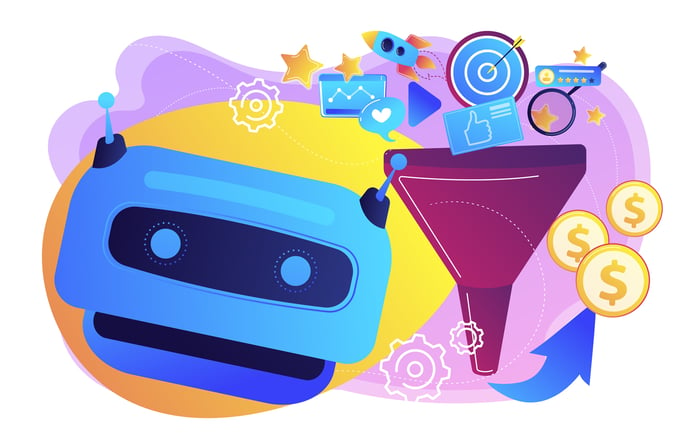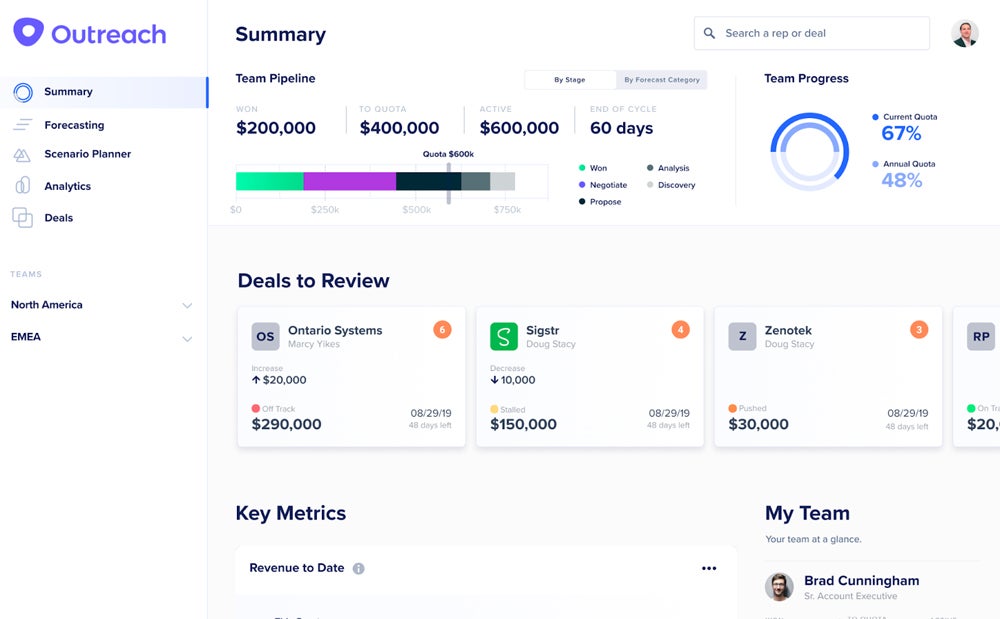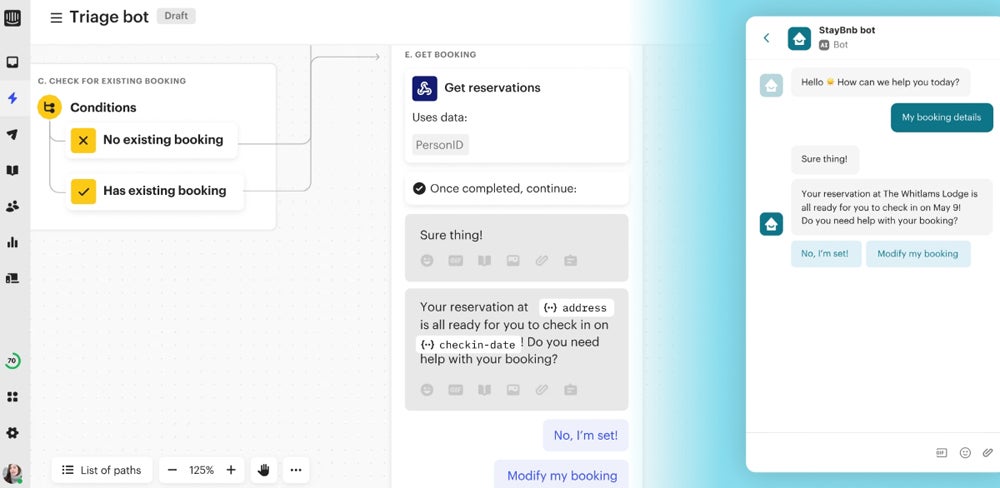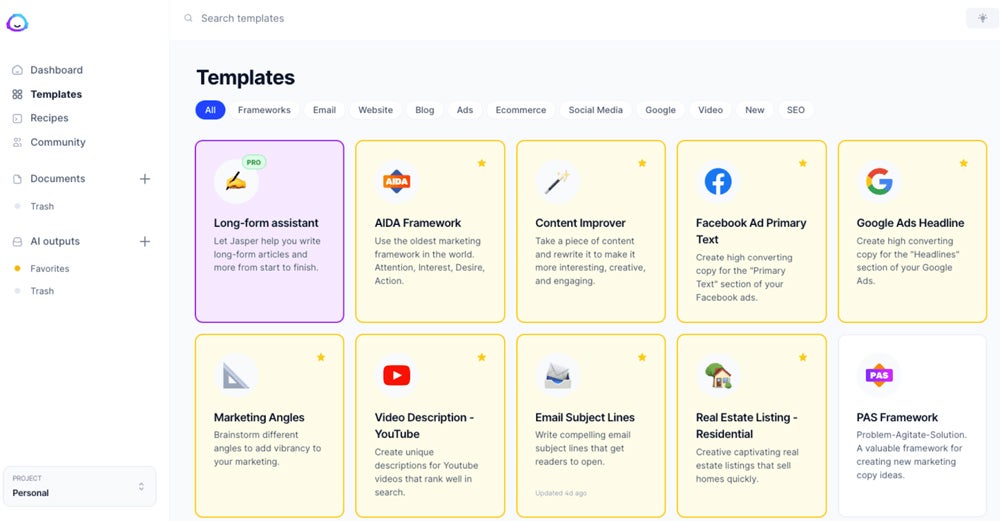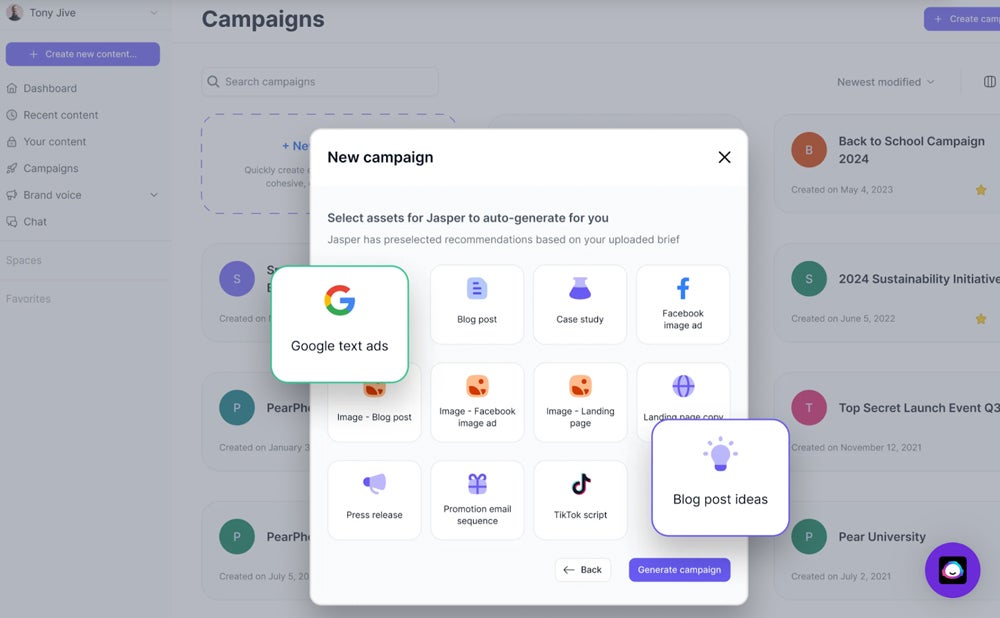Artificial intelligence (AI) and lead generation are a highly effective combination, as they give businesses unprecedented capabilities to enhance their marketing efforts and sales conversions.
AI for lead generation cuts across key areas like lead scoring, potential customer interactions, personalization, engagement, and sales campaigns, among others. Some of the most effective strategies that leverage AI to generate leads include:
- Using existing marketing assets for more effective lead generation.
- Enhancing buyer profiles through advanced data analysis.
- Optimizing lead scoring with predictive analytics.
- Streamlining interactions using conversational AI, such as chatbots.
- Delivering personalized customer service and tailored content.
- Improving segmentation and campaign optimization for targeted marketing.
- Employing predictive analytics for deeper market and customer insights.
- Leveraging AI-driven engagement to nurture and maintain leads.
In this guide, we’ll take a detailed look at techniques to use AI for lead generation, from using existing marketing assets to predictive lead scoring to social media engagement.
TABLE OF CONTENTS
Using Existing Marketing Assets for More Effective Lead Generation
AI tools can provide insights into what content drives lead generation and conversion by identifying high-performing assets and understanding key engagement metrics. These tools are capable of pinpointing successful content, assessing user engagement, and providing insights key to the strategic repurposing of assets to ensure that these assets are used to their maximum potential.
This enables marketers to repurpose and tailor existing materials to better match the interests of potential leads and maximize the impact of every asset in their marketing toolkit. For instance, artificial intelligence can recommend updating older successful blog posts with current data and SEO practices, which results in higher visibility and effectiveness without having to create new content from scratch.
Enhancing Buyer Profiles Through Advanced Data Analysis
Creating detailed buyer profiles with AI leads to much better targeting accuracy. AI tools can process vast amounts of data to build comprehensive profiles that reflect the behaviors, preferences, and needs of potential customers. If your marketing teams tailor their campaigns specifically to the segments that are most likely to convert, they can yield greater engagement and higher conversion rates.
Moreover, AI-driven profiling assists in the dynamic updating of buyer information. This makes sure that your marketing efforts remain relevant as the preferences of your customers evolve.
To gain a deeper understanding of today’s AI software for sales, read our guide to AI Sales Tools and Software
Optimizing Lead Scoring with Predictive Analytics
Predictive analytics’ impact on lead scoring has AI evaluating potential customers based on their interactions and engagement. It integrates multiple data points, including past interactions, demographic information, and behavioral signals, to score leads more precisely. These models allow companies to focus on leads with the highest potential for conversion, which in turn optimizes the allocation of sales resources.
AI continuously refines its scoring criteria based on new data, meaning the lead scoring model is improved over time. This enhances its predictive accuracy and makes sure that sales efforts are concentrated on the most promising prospects. The result? Maximized efficiency and success of sales campaigns.
Streamlining Interactions Using Conversational AI, Such as Chatbots
Conversational AI tools provide personalized responses at scale to significantly improve lead engagement. These AI-driven systems are capable of understanding and responding to customer queries in real time, as they are capable of guiding prospective customers through the buying process effectively.
By simulating natural conversation flows, chatbots can guide leads through the initial stages of the buying process, answering inquiries and providing information that helps build interest and trust.
This automating of initial communications means that AI chatbots make sure that only the most engaged and qualified leads are forwarded to human sales representatives, increasing the likelihood of conversions through efficient pre-qualification. It also reduces wait times associated with its instant response.
Delivering Personalized Customer Service and Tailored Content
AI is great at personalizing customer interactions by analyzing individual preferences and behaviors to curate customized content. This yields significantly higher customer engagement by ensuring that each interaction is relevant and resonates with the recipient. Personalization can range from customized email content to individualized product recommendations, all designed to increase the effectiveness of marketing efforts.
By employing machine learning algorithms, AI can suggest personalized product recommendations and customized content that align with the unique needs and interests of each lead. This not only fosters a deeper connection with potential customers but also increases the likelihood of conversion.
A screenshot of Outreach, displaying buyer engagement signals in real-time.
Improving Segmentation and Campaign Optimization for Targeted Marketing
AI uses sophisticated segmentation techniques that are capable of grouping customers based on specific characteristics. By dividing the audience into precise segments based on detailed criteria such as behavior, demographics, and purchase history, AI ensures that marketing efforts are directed at the right individuals. From these segments, marketing teams can create highly targeted and relevant marketing campaigns that are more likely to resonate with potential customers.
AI-driven analytics also enable marketers to continually refine and optimize these segments and their corresponding campaigns based on real-time performance data.
Employing Predictive Analytics for Deeper Market and Customer Insights
With predictive analytics, you can leverage AI to provide forward-looking insights into market trends and customer behaviors. This will enable you to anticipate needs and strategically align your marketing efforts. Such proactivity helps in positioning offerings to meet predicted market demands, and ultimately develop a competitive edge.
The insights you get from AI predictive analytics not only guide your strategic planning but also inform your operational decisions, which ultimately helps your teams stay ahead in a rapidly changing marketplace.
To learn about AI for customer relationship management, read our guide: Top 8 AI CRM Software
Leveraging AI-Driven Engagement to Nurture and Maintain Leads
AI-driven engagement tools maintain continuous interaction with leads throughout the buying journey. By analyzing engagement patterns and preferences, AI can deliver customized content and communications at optimal times to enhance lead nurturing efforts.
These AI systems help maintain the interest of potential customers by providing timely and relevant information. This guarantees that leads are nurtured effectively until they are ready to make a purchase.
8 AI Lead Generation Uses
AI lead generation is already a popular approach deployed by some of the top organizations today. Here are some of the real world uses of lead generation AI.
Data Acquisition and Analysis
AI plays a huge part in enhancing data acquisition and analysis for businesses aiming to refine their lead generation strategies.
For instance, Amazon leverages AI to analyze vast amounts of customer data to personalize shopping experiences, with an outcome of higher conversion rates. Similarly, Spotify utilizes AI-driven analytics to understand user preferences in music and podcasts. This helps Spotify create highly targeted marketing campaigns that resonate with their audience’s tastes and lead preferences.
Personalized Marketing Campaigns
Personalized marketing campaigns powered by AI are quite popular for increasing customer engagement across many sectors.
Netflix, for example, uses AI to analyze viewing patterns to recommend shows and movies, thereby improving viewer retention and satisfaction. Starbucks implements AI to adapt offers and promotions to individual customer preferences. The outcome is enhanced effectiveness of their marketing efforts and higher sales.
Predictive Lead Scoring
AI-based predictive lead scoring helps companies like HubSpot and Salesforce to efficiently prioritize their leads. HubSpot uses AI to score leads based on their engagement and past behavior to sharpen marketing focus and resource allocation.
Similarly, Salesforce applies AI to dynamically update lead scores, ensuring that sales teams can quickly adapt to new information and focus their efforts where they are most likely to get a breakthrough.
Chatbots and Virtual Assistants
Chatbots and AI virtual assistants are some of the most implemented solutions for customer interactions.
A common use case today is using AI chatbots to engage with visitors to your platform and gather information and qualify leads in real time. This enhances the efficiency of lead qualification while ensuring that customer experience remains seamless. A great example is a company like Intercom that has AI capabilities that allow it to automate responses and manage routine inquiries, which helps maintain customer engagement and frees up human agents for more complex issues.
A bot automating accommodation booking responses on Intercom.
Social Media Listening and Engagement
Companies are increasingly using AI for social media listening to tap into customer sentiments and emerging trends.
AI companies in this niche use AI tools to analyze social media data to track brand mentions and customer feedback to provide actionable insights to influence strategic marketing decisions.
A platform like Hootsuite gives its users tools to evaluate engagement, such as an Instagram engagement rate calculator, and similar tools for other social media platforms. It also offers tools to optimize post timings and content strategies across social platforms.
Lead Nurturing and Relationship-Building
AI for lead generation improves lead nurturing and relationship building. You have platforms like Salesforce using AI to track customer interactions and predict future needs, giving sales teams crucial insights to personalize follow-ups. Platforms like HubSpot use AI to evaluate email engagement to optimize communication strategies, which ensures that messages resonate well with the audience and increase the likelihood of conversion.
Products like Zoho CRM use AI to analyze interaction patterns to optimize contact schedules and content. The result is enhanced lead engagement and conversion.
To see a list of the leading generative AI apps, read our guide: Top 20 Generative AI Tools and Apps 2024
Predictive Recommendations
Lead generation using AI plays a part in predictive recommendations, which offer powerful tools for businesses to anticipate customer needs and adapt their offerings.
Two popular examples are Amazon’s recommendation engine, which uses AI to suggest products based on past purchases and browsing behaviors to directly influence buying decisions; and Netflix, which uses a similar approach to suggest films and shows to keep users engaged and subscribed.
AI-Enhanced Content Creation
We’re living through a boom of automated content generation, especially for marketing and sales purposes.
One tool in particular, ChatGPT, has risen in popularity exponentially by using generative AI to produce human-like content, which can help form a connection with prospective customers.
Jasper AI and Grammarly use AI to assist users in creating high-quality written content that is optimized for both audience engagement and SEO. These tools analyze existing content to suggest improvements and generate new content that aligns with specified goals, streamlining content creation workflows for marketers and content creators.
A variety of templates for content generation in Jasper.
8 Benefits of Using AI for Lead Generation
- Increased efficiency and automation: AI automates routine tasks lead generation, like data entry and lead qualification, to free marketing and sales teams to focus on more strategic activities.
- Improved lead scoring accuracy: Lead generation AI uses models that analyze historical data and real-time interactions to score leads more accurately, which makes sure that sales efforts are focused on the leads most likely to convert.
- Greater personalization: AI personalizes marketing messages and offers to significantly increase engagement and conversion rates by delivering content that is highly relevant to each individual lead.
- Cost reduction: By streamlining and automating parts of the lead generation process, AI helps reduce costs associated with manual lead handling and inefficiencies.
- Higher conversion rates: With AI’s ability to predict lead behavior and adapt interactions, you can yield higher conversion rates as leads are more effectively nurtured through the sales funnel.
- Scalability of lead generation efforts: AI can handle large volumes of data and interactions simultaneously, meaning businesses can scale their lead generation activities without compromising quality or performance.
- Enhanced customer engagement: AI tools enable real-time, personalized interactions that keep potential leads engaged, which improves user experience and increases the likelihood of conversion.
- Smart sales forecasting: AI’s predictive capabilities help companies forecast future sales trends based on current data and prepare them for upcoming market changes, allowing them to optimize their strategies accordingly.
3 Lead Generation AI Tools To Consider
Jasper.ai
Jasper.ai is a powerful tool for predictive analytics in lead generation, as it enables marketers to create highly personalized and optimized content at scale.
Jasper.ai harnesses advanced machine learning algorithms to analyze user data and generate content that resonates with target audiences. It’s great for lead generation as it helps develop compelling copy, such as blog posts, ad copy, and email marketing content, that are adapted to the audience’s interests and capable of improving lead nurturing sequences and sales outreach.
A Campaigns dashboards in Jasper.
Seamless.ai
Seamless.ai provides deep social media insights and precise targeting capabilities that empower marketers to identify and engage with ideal customer profiles across various platforms. By aggregating data from web traffic and social media interactions, Seamless.ai offers actionable insights that help businesses improve their outreach strategies. This results in more efficient lead generation processes and higher conversion rates.
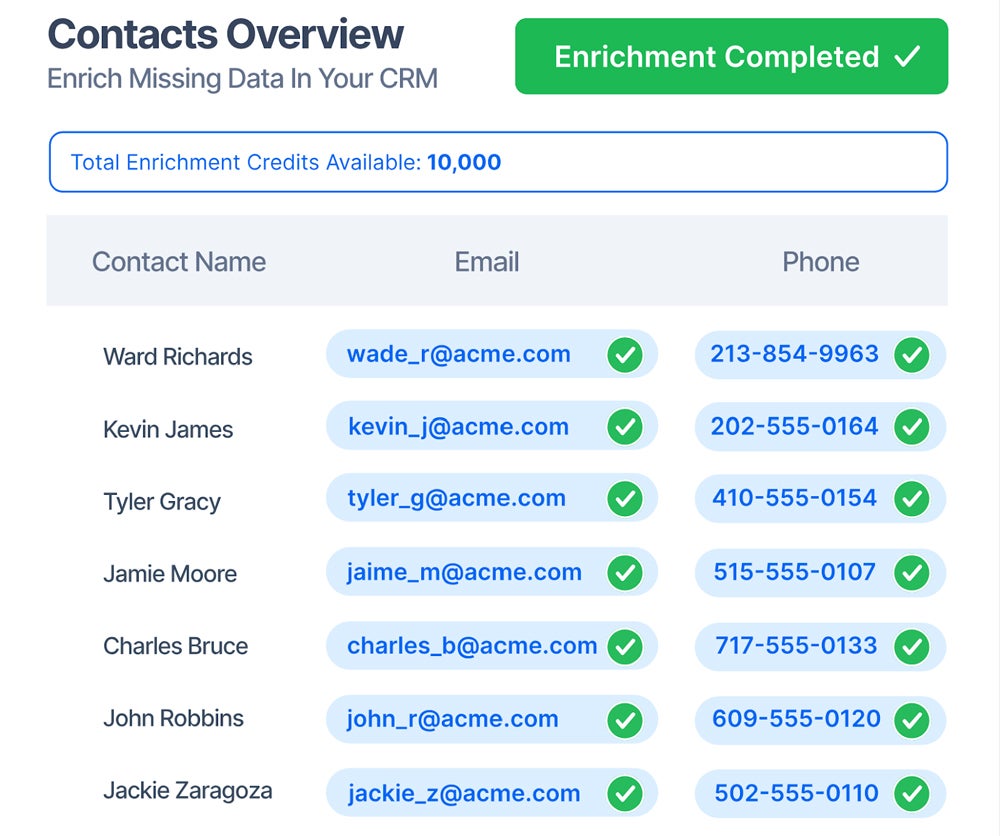
LeadIQ
LeadIQ excels as a B2B lead generation tool that focuses on LinkedIn outreach. It offers features such as real-time data verification, lead enrichment, and seamless integration with CRM systems. LeadIQ’s capabilities enable sales teams to engage with highly qualified leads effectively, enhancing the overall efficiency of sales strategies and increasing the chances of converting prospects into loyal customers.
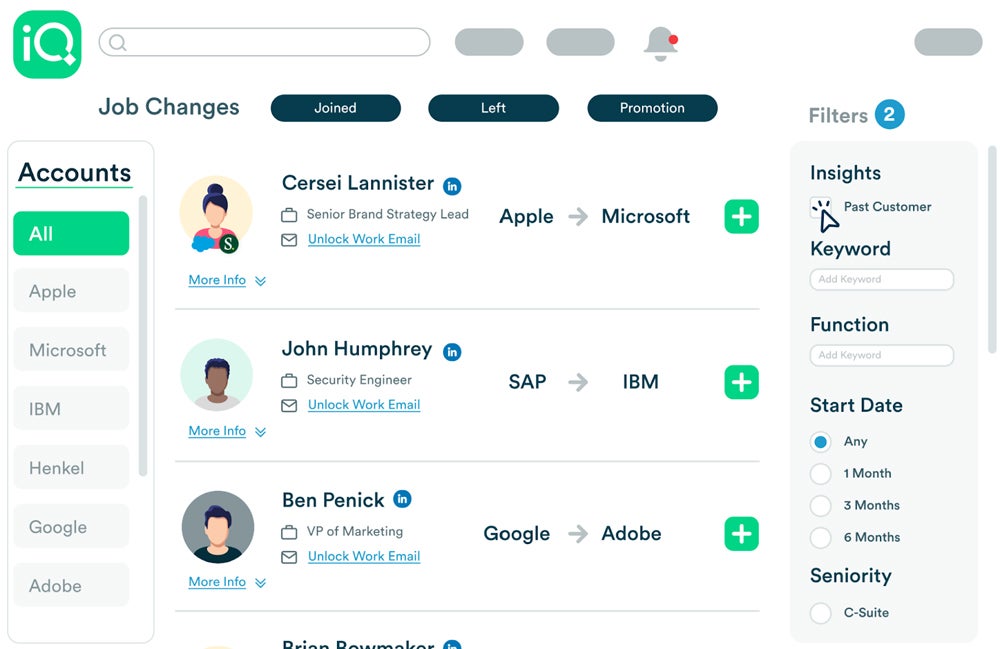
The Future of Sales Lead Generation Using AI
The future of AI in lead generation will bring significant advancements and shifts in strategy. Here are some of the developments to expect:
Enhanced Personalization and Buyer Intent Data
The future of AI in sales lead generation lies in the ability of advanced AI algorithms to evolve and improve. Better performing models will improve the quality of insights around the understanding and predicting of buyer behavior. This will lead to unprecedented personalization of marketing efforts, where AI tools can be used to more effectively tailor marketing and sales strategies precisely to individual customer profiles, dramatically improving conversion rates.
Integration of AI Across All Stages of Sales Lead Generation
In case you’re wondering how to automate lead generation across the whole lead generation process, AI is expected to become more deeply integrated into all stages of this process, from initial lead capture to final conversion. This integration helps to automate and optimize tasks such as initial customer contacts, follow-ups, and final conversions, making the entire sales funnel more efficient.
Advancements in Predictive Analytics for Lead Scoring
AI technologies will continue to advance in the area of predictive analytics, which will further enhance lead scoring systems. Sales teams will more accurately target potential customers who are most likely to convert.
Ethical Use and Transparency in AI-Driven Sales
It’s no secret that AI will take on a more significant role in sales lead generation. As a result, we should expect an increased focus on the ethical use of AI tools and the transparency of AI-driven processes. Companies will need to pay greater attention to how they use AI to ensure they maintain trust and comply with increasing regulatory standards regarding data use and privacy.
Automation and Real-Time Decision-Making
The trajectory of AI development will introduce more capable lead generation AI tools, and one of the most important areas that’s set to benefit is automation and real-time decision-making. We can expect to see greater automation and faster real-time decision-making capabilities across sales lead generation to fast-track the sales process.
Frequently Asked Questions (FAQs)
Can I Use AI to Generate Leads?
Yes, you can use AI to generate leads, as AI lead generation involves using artificial intelligence to identify, qualify, and generate leads. AI tools powered by machine learning algorithms can find potential customers, engage with them, and nurture them through the sales funnel.
Can You Automate Lead Generation?
Absolutely, lead generation can be automated to perform time-consuming tasks on your behalf. This includes sending emails, managing contact lists, and scoring leads. Automation helps reduce human error, save time, and provide insights into lead generation performance.
How Do You Generate Leads Using ChatGPT?
To generate leads using ChatGPT, you can identify your target audience, understand who your potential customers are, and craft compelling content that addresses their needs and interests.
Then you can utilize ChatGPT’s conversational abilities to engage with users in a personalized way to capture their interest. You can also generate content that’s optimized for search engines to attract more visitors and use chatbots powered by ChatGPT to interact with them and collect contact information.
How Hard Is Lead Generation?
Lead generation can be challenging due to factors like finding and forming an appropriate lead generation strategy, creating a balance between quality and quantity of leads, measuring the return on investment for lead generation campaigns, as well as effectively nurturing new leads generated to convert them into customers.
Bottom Line: AI Promises to Greatly Improve Lead Generation
AI for lead generation has brought a myriad of benefits and an endless sea of functionality to this challenging process. It yields greater efficiency and automation, and more personalization opportunities, among other benefits. However, you have to choose the right lead generation software to yield such benefits. The right tool will offer high accuracy, can easily integrate with your existing stack, and is compliant with data privacy regulations.
For a full portrait of the AI vendors serving a wide array of business needs, read our in-depth guide: 150+ Top AI Companies
